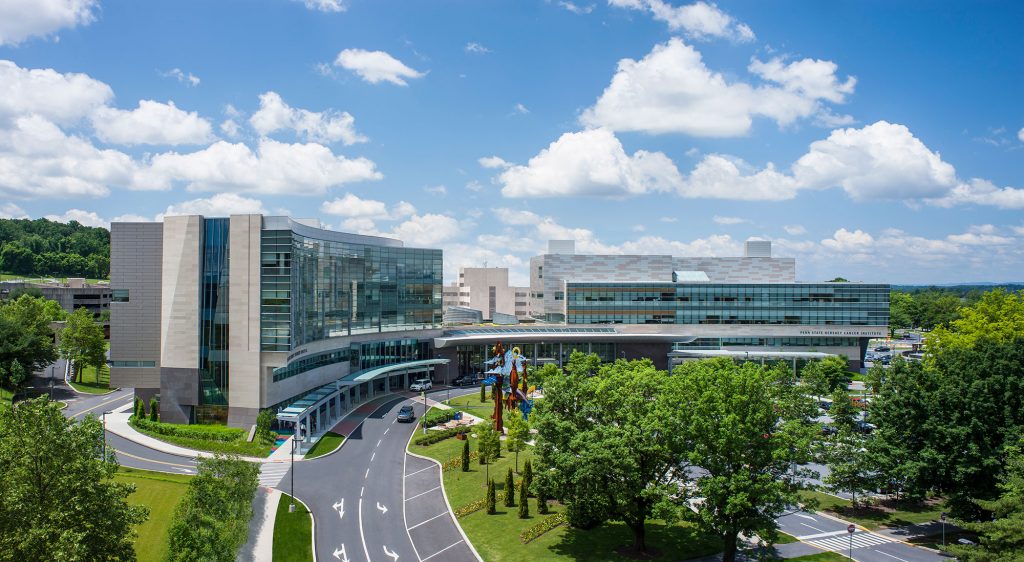Jump to topic
Search
Program Details
The Division of Pulmonary, Allergy and Critical Care is part of the Department of Medicine at Penn State Health and Penn State College of Medicine, and proudly offers an Interventional Pulmonology Fellowship with a state-of-the-art bronchoscopy/pleural suite.
The one-year position has a concomitant service commitment for 10 weeks in the MICU/Pulmonary Consultation Service.
Learn More about the Fellowship
Thank you for your interest in the Interventional Pulmonology fellowship at Penn State Health Milton S. Hershey Medical Center! We are a dedicated team of thoracic physicians proud to offer cutting-edge technology and a wealth of procedures and experience in interventional pulmonology and pleural disease. We work closely with the divisions of Thoracic Surgery, Oncology, Radiation Oncology and others to provide the best multidisciplinary care to lung cancer patients and those with benign conditions of the airway, lung and pleura.
We are proud of our pleural disease clinic and involvement in benign airway and lung disease diagnosis and management along with other experts in the field.
The fellow is expected to actively participate in the inpatient IP consultation service as well as all advanced procedures, and to help with instruction of basic bronchoscopy to the general pulmonology fellows.
Thank you for your interest! We look forward to sharing more information with you.
Sincerely,
Jennifer W. Toth, MD
Professor of Medicine and Surgery
Director, Interventional Pulmonology Section
Director, Interventional Pulmonology Fellowship
Director, Lung Cancer Screening and Nodule Program
Application Overview
All applications are received through the Association of Interventional Pulmonology Program Applicants.
Application deadline is Aug. 15; however, the application review process begins July 15, so applicants are encouraged to apply early.
More information is available through the American Association for Bronchology and Interventional Pulmonology or the Association of Interventional Pulmonology Program Directors.
Eligibility
Qualified candidates will be:
- U.S. citizens or permanent residents (no visas are sponsored)
- Board-eligible or board-certified in internal medicine
- Pennsylvania medical training license eligible
Interview Process
All interviews are by invitation only.
Candidates selected to interview will be contacted by the program coordinator and/or Thalamus. Thalamus is the scheduling service that the program uses to streamline interview scheduling; all interviews must be scheduled and managed through Thalamus. Applicants who encounter problems with Thalamus should contact the program coordinator.
Virtual Tour
Penn State Health
Penn State Health is an integrated academic health system serving patients and communities across 15 counties in central Pennsylvania. It employs more than 20,900 people systemwide.
The system includes Penn State Health Milton S. Hershey Medical Center, Penn State Health Children’s Hospital and Penn State Cancer Institute based in Hershey, Pa.; Penn State Health Hampden Medical Center in Enola, Pa.; Penn State Health Holy Spirit Medical Center in Camp Hill, Pa.; Penn State Health Lancaster Medical Center in Lancaster, Pa.; Penn State Health St. Joseph Medical Center in Reading, Pa.; Pennsylvania Psychiatric Institute, a specialty provider of inpatient and outpatient behavioral health services, in Harrisburg, Pa.; and 2,417 physicians and direct care providers at 225 outpatient practices. Additionally, the system jointly operates various healthcare providers, including Penn State Health Rehabilitation Hospital, Hershey Outpatient Surgery Center and Hershey Endoscopy Center.
In 2017, Penn State Health partnered with Highmark Health to facilitate creation of a value-based, community care network in the region.
Penn State Health shares an integrated strategic plan and operations with Penn State College of Medicine, the University’s medical school. With campuses in State College and Hershey, Pa., the College of Medicine boasts a portfolio of more than $150 million in funded research and more than 1,700 students and trainees in medicine, nursing, other health professions and biomedical research.
Learn more about Penn State Health

Penn State Health Children’s Hospital (left), Penn State Health Milton S. Hershey Medical Center (center) and Penn State Cancer Institute (right)
Penn State Health Milton S. Hershey Medical Center
500 University Dr., Hershey, Pa., 17033 (Derry Township, Dauphin County)
- The health system’s 611-bed flagship teaching and research hospital
- The only medical facility in Pennsylvania accredited as both an adult and a pediatric Level I (highest-level) trauma center
- Dedicated surgical, neuroscience, cardiovascular, trauma and medical intensive care units
- Accredited Life Lion critical-care transport providing more than 1,100 helicopter and approximately 750 ground ambulance transports per year
- More than 1,300 faculty members and more than 650 residents and fellows
- Approximately 29,000 admissions, 73,000 emergency department visits, 1.1 million outpatient visits and 33,000 surgical procedures annually
- Designated as a Magnet hospital since 2007
Learn more about Milton S. Hershey Medical Center
Penn State Health Children’s Hospital
600 University Dr., Hershey, Pa. 17033 (Derry Township, Dauphin County)
- An eight-story, 263,000-square-foot-facility built in 2013 and expanded in 2020
- 160 licensed pediatric beds, 26-bed pediatric intensive care unit and a 56-bed neonatal intensive care unit
- Level IV (highest-level) neonatal intensive care unit
- Level I quaternary (highest-level) pediatric intensive care unit
- Level I (highest-level) pediatric trauma center designation
- Intermediate care unit
- Dedicated pediatric operating rooms
- More than 150,000 pediatric outpatient visits, 20,000 pediatric emergency room visits, and approximately 5,000 pediatric patient discharges annually
Welcome to Hershey
More About Hershey
Interested in learning more about living and working in Hershey, Pa.? See details here:
Wellness, including emotional, spiritual, social and physical health, is a crucial component to training and to becoming a professional, compassionate and resilient physician. Self-care is a skill which must be continually practiced and reinforced. Penn State College of Medicine and Penn State Health are committed to addressing wellness among residents and fellows, with multiple resources readily available.
Institutional resources
- Visit BeWell – a health program designed to support Penn State Health employees
- See Penn State College of Medicine wellness resources here
- Employee Health Care Concierge and Case Management Service
- Partners in Medicine
Moving to a new city with your family does not have to be stressful. Residency programs have assisted many significant others with finding employment. There is also a GME-Wide Partners in Medicine (PIM) group that offers networking opportunities as well as various social and community oriented activities. - The Doctors Kienle Center for Humanistic Medicine
- Active and easily accessed Office of Professional Mental Health
Graduate medical education resources
Institutional Resources
Penn State Health and Penn State College of Medicine celebrate, embrace and support the diversity of all patients, faculty, staff, students and trainees.
Office for Diversity, Equity and Inclusion
In keeping with this, Penn State Health has an active Office for Diversity, Equity and Inclusion with various programs, networks and resource groups, including:
- Talks and lectures on diversity, equity and inclusion through the Inclusion Academy
- Regular events on topics such as eradicating racism and creating a culture of inclusiveness
- Many Business Employee Resource Groups (BERGs), including:
- Disability Business Employee Resource Group
- Interfaith Business Employee Resource Group
- LGBTQ+ Business Employee Resource Group
- Military and Veterans Business Employee Resource Group
- Multicultural Business Employee Resource Group
- NextGen Business Employee Resource Group
- Black Physician Professional Staff Association – Resource Group
- Hispanic Professional Association
- Asian Physician and Professional Staff Association
- International Workforce Inclusion
- Inclusion Academy
Learn more about the Penn State Health Office for Diversity, Equity and Inclusion
Learn more about the College of Medicine’s Office for Diversity, Equity and Belonging
Office for Culturally Responsive Health Care Education
The vision at Penn State College of Medicine and Penn State Health is to equip learners with the knowledge, skills and attitudes they will need to provide culturally excellent health care and research for an increasingly diverse U.S. population. The Office for Culturally Responsive Health Care Education was formed to help meet that goal.
Learn more about the Office for Culturally Responsive Health Care Education
Office for a Respectful Learning Environment
In addition, the institution does not tolerate discrimination, biases, microaggression, harassment or learner mistreatment of any kind, and any concerns are immediately addressed by the Office for a Respectful Learning Environment.
Learn more about the Office for a Respectful Learning Environment
Network of Under-represented Residents and Fellows
The Network of Under-represented Residents and Fellows (NURF) is a group of diverse residents and fellows representing all specialties. NURF’s goal is to promote cultural diversity in the residency programs through community involvement, mentorship with diverse faculty, professional networking and support for the recruitment of diverse medical students into the residency programs.
NURF is sponsored by the Penn State College of Medicine Graduate Medical Education Office and the Penn State Health Office for Diversity, Equity and Inclusion.
Mailing Address
Interventional Pulmonary Sevice
Division of Pulmonary, Allergy and Critical Care Medicine
500 University Dr., MC H041
P.O. Box 850
Hershey, PA 17033-0850
General Contact Information
Phone: 717-531-0260
Fax: 717-531-5785
Curriculum Details
The Interventional Pulmonology (IP) service at Penn State Health started in 2007 under the leadership of Dr. Jennifer Toth.
Since then, the service has been an active part of the multidisciplinary thoracic oncology program with thoracic surgery.
Currently, the service serves the central Pennsylvania area, performing more than 600 procedures per year with a state-of-the-art bronchoscopy/pleural suite with full anesthesia support. The service participates in several multicenter research studies in the field.
Interventional Pulmonology also collaborates often with other institutions in publication of procedural data and reports on efficacy and safety of treatments and procedures.
The Interventional Pulmonology Fellowship training focuses on the diagnosis and management of central airway obstruction, lung cancer, pleural diseases and specialized procedural training in various airway and pleural procedures. At the end of the 12-month training period, the fellow will:
- Have specific knowledge for the different types of procedures (indications, contraindications, specific population)
- Have the skills to perform advanced and complex airway/pleural procedures
- Lead a multidisciplinary team in the management of complex cases
- Develop research ideas and have at least one publication in the field
- Successfully pass the IP board examination
These procedures are offered in the 12-month Interventional Pulmonology Fellowship:
Airway Procedures
- Advanced bronchoscopy procedures and airway stenting/dilatation
- Rigid bronchoscopy
- Metallic, silicone stents and Montgomery T-tubes
- Balloon tracheoplasty and bronchoplasty
- Percutaneous tracheostomy
- Tumor destruction and control of central airway bleeding
- Microdebrider
- Electrocautery
- Argon plasma coagulation
- Cryotherapy
- Endobronchial therapy
- Steroid injection
- Endobronchial administration of mitomycin
- Advanced diagnostic bronchoscopy
- Diagnostic modalities for diagnosis of early lung cancer
- Radial EBUS: Assessment of airway invasion
- Diagnostic modalities for diagnosis of peripheral lung lesions
- Electronavigational bronchoscopy with percutaneous needle biopsy (Veran system)
- Radial EBUS and fluoroscopy
- Diagnostic modalities for lymph node sampling
- Linear EBUS: Real-time sampling with transbronchial needle aspirate
- Diagnostic modalities for interstitial lung disease
Pleural Procedures
- Chest ultrasound
- Ultrasound-guided thoracentesis
- Pleural manometry
- Ultrasound-guided chest tube placement
- Tunneled indwelling pleural catheters
- Thoracoscopy (rigid and semi-rigid), pleural biopsy and chemical pleurodesis
The Interventional Pulmonology service at Penn State includes a complex airway program and pleural service. Additional clinical support is provided by two dedicated nurse practitioners (thoracic surgery and IP), two nursing coordinators (malignant and benign disease) and rotating general pulmonology fellows, so the IP fellow in training can focus on learning advanced bronchoscopic and pleural procedures.
The program is associated with three specialty clinics: the thoracic oncology clinic, pleural clinic and lung cancer screening clinic. It is part of both the multidisciplinary thoracic oncology and ILD programs.
In addition, all procedures are performed in the state-of-the-art bronchoscopy suite located in the operating room with 24/7 access with full support of dedicated cardiothoracic anesthesia faculty.
The IP fellow will be encouraged to participate in original research as well as multicenter and multidisciplinary projects. Penn State has a longstanding history of multi-institution research collaboration within IP.
- Weekly Interventional Pulmonology Core Curriculum Lecture Series (every Thursday, 7:30 a.m.)
- Weekly Thoracic Surgery Core Curriculum (every Thursday at 4 p.m.)
- Weekly Multidisciplinary Thoracic Oncology Conference (every Tuesday at noon)
- Morbidity and Mortality
- Journal Club
- Monthly Multidisciplinary Airway Conference, which alternates with Journal Club
Latest News from Pulmonology






